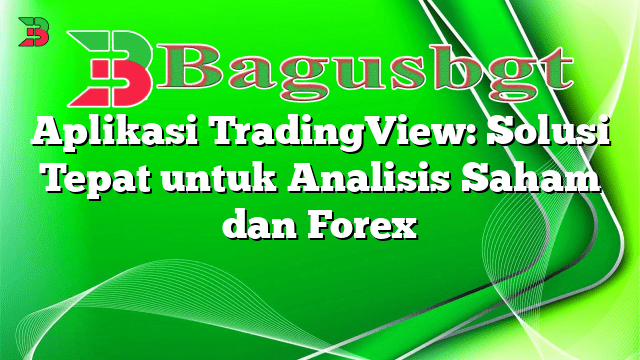Salam and welcome to our informative article on the basics of forex trading. In this article, we will provide you with a comprehensive understanding of the key concepts and processes involved in forex trading. Whether you are a beginner or an experienced trader looking to refresh your knowledge, this article will serve as a valuable resource for you. So, let’s dive right in!
1. What is Forex Trading?
Forex trading, also known as foreign exchange trading, is the process of buying and selling currencies in the global marketplace. It involves trading currency pairs, such as EUR/USD or GBP/JPY, with the aim of making a profit from the fluctuations in exchange rates.
Forex trading operates 24 hours a day, five days a week, as it involves various global markets located in different time zones. The main participants in the forex market are central banks, commercial banks, financial institutions, hedge funds, and individual traders.
Advantages of Forex Trading
| Advantages | Explanation |
|---|---|
| Liquidity | The forex market is the largest and most liquid financial market in the world, providing traders with the ability to enter and exit positions easily. |
| High Leverage | Forex brokers offer high leverage, allowing traders to control larger positions with a smaller amount of capital. |
| 24/5 Market | Forex trading is available around the clock, providing flexibility for traders to trade at any time that suits them. |
| Global Market | Being a global market, forex trading offers a wide range of currency pairs and trading opportunities. |
Disadvantages of Forex Trading
While forex trading offers numerous advantages, it is essential to be aware of the potential disadvantages:
- High Volatility: The forex market can be highly volatile, leading to rapid price fluctuations and increased risk.
- Complexity: Forex trading involves understanding various factors that influence currency exchange rates, such as economic indicators, geopolitical events, and central bank decisions.
- Risk of Losses: Like any investment, forex trading carries the risk of financial losses. It is crucial to have a well-defined risk management strategy in place.
2. How Does Forex Trading Work?
Forex trading involves speculating on the future direction of currency pairs. Traders analyze various factors to predict whether a currency will appreciate or depreciate in value. If they believe a currency will rise in value, they buy it, and if they believe it will fall, they sell it.
Profit or loss is determined by the difference in the exchange rates between the time of buying and selling the currency pair. Traders can utilize different trading strategies, such as technical analysis, fundamental analysis, or a combination of both, to make informed trading decisions.
3. Key Participants in Forex Trading
Several key participants contribute to the functioning of the forex market:
- Central Banks: Central banks play a crucial role in setting monetary policies and managing a country’s currency. Their actions can significantly impact exchange rates.
- Commercial Banks: Commercial banks facilitate forex transactions for their clients and engage in speculative trading to profit from currency fluctuations.
- Financial Institutions: Financial institutions, including pension funds, insurance companies, and investment firms, participate in forex trading to diversify their investment portfolios.
- Hedge Funds: Hedge funds are large investment funds that aim to generate high returns through various strategies, including forex trading.
- Individual Traders: Individual traders, including retail traders and institutional traders, actively participate in forex trading to capitalize on market movements.
4. Common Forex Trading Strategies
Forex traders employ various strategies to make profitable trading decisions. Some popular strategies include:
- Technical Analysis: Traders analyze historical price data and utilize technical indicators to identify patterns and trends that can help predict future price movements.
- Fundamental Analysis: Traders assess economic indicators, news events, and geopolitical factors to determine the intrinsic value of a currency.
- Carry Trade: Traders take advantage of interest rate differentials between two currencies by borrowing in a low-interest-rate currency and investing in a high-interest-rate currency.
- Breakout Strategy: Traders identify key levels of support and resistance and enter trades when the price breaks through these levels, anticipating a significant price movement.
5. Forex Trading Platforms
Forex traders execute their trades through trading platforms provided by forex brokers. These platforms offer access to real-time market data, charting tools, order execution capabilities, and other trading features.
Popular forex trading platforms include MetaTrader 4 (MT4), MetaTrader 5 (MT5), cTrader, and NinjaTrader. Traders should choose a platform that meets their trading needs and preferences.
6. Risk Management in Forex Trading
Effective risk management is crucial in forex trading to protect capital and minimize losses. Traders should consider the following risk management techniques:
- Setting Stop Loss Orders: Traders set predetermined levels at which their trades will be automatically closed to limit potential losses.
- Using Take Profit Orders: Traders set profit targets to automatically close their trades when the price reaches a desired level.
- Applying Proper Position Sizing: Traders determine the appropriate position size for each trade based on their risk tolerance and account balance.
- Diversifying Trades: Traders spread their risk by trading different currency pairs and employing various trading strategies.
7. Frequently Asked Questions (FAQ)
Q: What is the minimum amount of capital required to start forex trading?
A: The minimum capital requirement varies among forex brokers but can be as low as $100.
Q: Can I trade forex without using leverage?
A: Yes, you can trade forex without leverage, but it may limit your trading opportunities and potential profits.
Q: Is forex trading suitable for beginners?
A: Forex trading can be challenging for beginners, but with proper education, practice, and risk management, it can be a rewarding endeavor.
Conclusion
In conclusion, understanding the basics of forex trading is essential for anyone looking to venture into this exciting financial market. By grasping the concepts explained in this article and continuously expanding your knowledge, you can develop the skills needed to navigate the forex market successfully. Remember, forex trading carries risks, so always approach it with caution and employ proper risk management techniques. Happy trading!
 Bagus Banget Kumpulan Informasi terbaru dari berbagai sumber yang terpercaya
Bagus Banget Kumpulan Informasi terbaru dari berbagai sumber yang terpercaya




